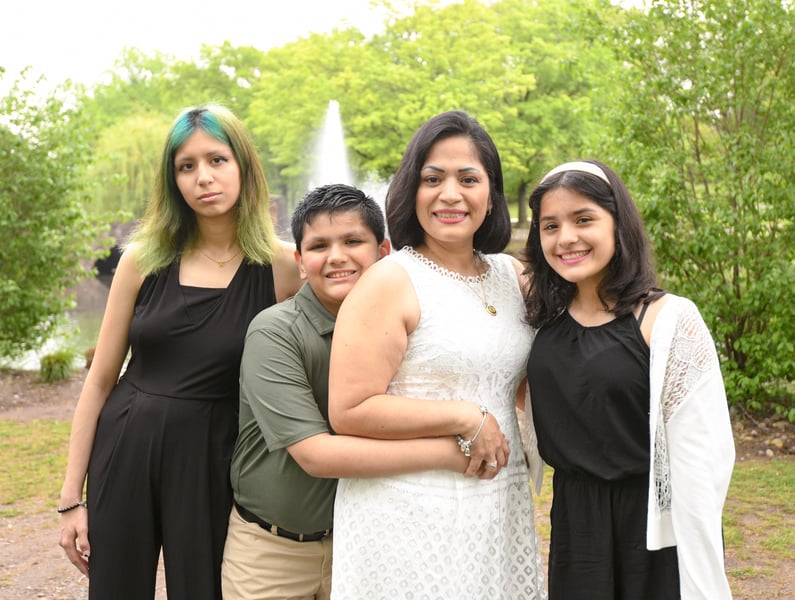Get Healthy!

- Posted March 15, 2023
Colon Cancer in the Young: One Woman's Story
Tatiana Gonzalez had just quit her job as a postal carrier, and with it the 12 miles a day she walked as she delivered people's mail.
So Gonzalez, then 39, figured that was why she suddenly became so constipated that she required laxatives to go to the bathroom.
"I thought to myself, maybe it has to do with because I'm not doing exercise anymore,"she said. "But in a couple of months, I start seeing blood in the stool."
It turned out that Gonzalez, now 42 and living in Clifton, N.J., actually had stage 3 colon cancer -- which she found out through a colonoscopy.
"It was devastating,"she recalled of her diagnosis. "Waking up in a doctor's office and he just approaches you and all of a sudden he tells you that you have colon cancer. I couldn't believe it. And I told him, 'I'm sorry, can you repeat that?' He said, 'you have colon cancer.' It was devastating because I never thought that that would happen to me."
Colon cancer is thought to be a disease of the old, and it is true that a person's risk increases with age, said Gonzalez's cancer specialist, Dr. Andrew Jennis of Hackensack Meridian Health in Hackensack, N.J.
But the number of young adults diagnosed with colon cancer has nearly doubled since 1995, said Dr. Steven Lee-Kong, chief of colorectal surgery at Hackensack University Medical Center.
Today, 1 in every 5 cases of colon cancer occurs in someone 45 or younger, Lee-Kong said.
"A 38-year-old who has bleeding, a lot of times they might blame it on hemorrhoids and not even do the proper testing to look for a colon or a rectal cancer,"Jennis said. "I think there's becoming an increasing awareness, but there's still sort of the bias that younger people shouldn't be getting colorectal cancer. And sometimes it does lead to some delay in diagnosis as patients put off bringing it to their doctor's attention, just assuming I'm young and there must be some other innocuous reason."
Following her diagnosis, Gonzalez immediately started four months of chemotherapy followed by six weeks of combination chemo/radiation therapy, running from May to October 2019, Jennis said.
She then underwent surgery in January 2020 to remove the cancer that was left, Jennis said.
Gonzalez had to wear an ileostomy bag for a short while after her surgery while she recovered, she said. But that has been reversed, and she has been cancer-free since her surgery.
That doesn't mean everything has gone back to normal, however.
"I thought that I was going to be the same person as before, being able to eat anything, but no. For some reason, I'm lactose intolerant. I cannot have cake. I can't have cheese. I can't have beans. I can't eat broccoli, rice. There's a lot of things that I cannot eat,"Gonzalez said. "My stomach is very different now than before."
Researchers can't say for sure why the number of young people with colon cancer has been increasing, Jennis and Lee-Kong said.
"They're making up an increasing number of patients who have colon cancer, for reasons that remain a little bit unclear," Jennis said. "We don't know why that age shift is happening, but it is happening."
Some risk factors for colon cancer include obesity, lack of physical activity, excessive alcohol use, smoking, and a diet heavy in red meats, smoked meats and saturated fats, he said.
There also might be changes in gut bacteria or genetics that are contributing to increased rates among the young, Lee-Kong said.
Gonzalez said that her grand-aunt had both colon and breast cancer.
"Maybe it has to do with that," she said. "To be honest, I don't know."
Even though she's been cancer-free for a few years now, Gonzalez said she has to be monitored for another seven or eight years before she can be declared in remission.
"I have to be very careful because the cancer may come back at any time,"she said. "It affects me every single day. I mean, I have three kids, and it's hard."
The American Cancer Society and the U.S. Preventive Services Task Force recommend people start regular colon cancer screening at age 45.
But young adults who have changes in their bowel habits or find blood in their stool should see a doctor, Jennis said.
"While most of the time bleeding in your stool is not because of cancer, don't assume you know what the explanation is,"he said. "They should do the appropriate testing for that specific circumstance, to make sure that the reason for the bleeding or the bowel habit change is identified and not just presume that it's not something serious."
Gonzalez also warns young adults to not shrug off bathroom problems.
"Listen to the body. The body gives you signals,"Gonzalez said. "Don't wait until the end. Go to the doctor, talk to your GI [specialist]. Ask them to do a colonoscopy. I know some people think colonoscopy is hard, but it saves your life if you find out that something is wrong with you sooner."
More information
Yale Medicine has more about young people and colon cancer.
SOURCES: Tatiana Gonzalez, Clifton, N.J.; Andrew Jennis, MD, oncologist/hematologist, Hackensack Meridian Health, Hackensack, N.J.; Steven Lee-Kong, MD, chief, colorectal surgery, Hackensack University Medical Center, Hackensack, N.J.







